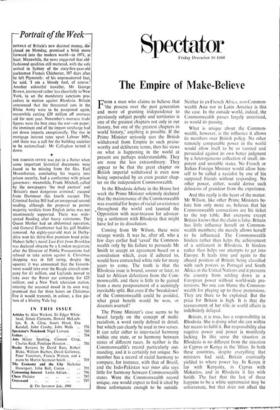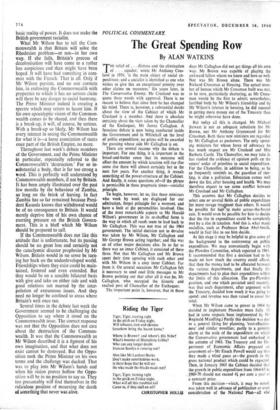The Empire of Make-Believe
UROM a man who claims to believe that 1 'the process over the past generation and more of granting independence to previously subject people and territories is one of the greatest chapters not only in our history, but one of the greatest chapters in world history,' anything is possible. If the Prime Minister seriously sees the British withdrawal from Empire in such praise- worthy and deliberate terms, then his views on what is happening in the world at present are perhaps understandable. They are none the less extraordinary. They appear to be that the great chapter on British imperial withdrawal is even now being superseded by an even greater chap- ter on the independent Commonwealth.
In the Rhodesia debate in the House last week the Prime Minister solemnly declared that the maintenance of the Commonwealth was essential for hopes of racial co-existence throughout the world and taunted the Opposition with near-treason for advocat- ing a settlement with Rhodesia that might have led to its dissolution.
Coming from Mr Wilson, these were strange words. It was he, after all, who a few days earlier had 'saved' the Common- wealth only by his failure to persuade Mr Smith to accept an agreement based on a constitution which, even if adhered to, would have entrenched white rule for many years to come. The truth is that the Rhodesia issue is bound, sooner or later, to lead to African defections from the Com- monwealth, and there is little to be gained from a mere postponement of a seemingly inevitable split. But even if the 'breakdown' of the Commonwealth could be avoided, what great benefit would be won, or disasters averted?
The Prime Minister's case seems to be based largely on the concept of multi- racialism, a word rarely defined in detail, but which can clearly be used in two senses. It can refer either to inter-racial harmony within one state, or to harmony between states of different races. In neither is the Commonwealth's record particularly out- standing, and it is certainly not unique. No member has a record of racial harmony to compare, for instance, with that of Brazil, and the Indo-Pakistan war inter alia says little for harmony between Commonwealth states. Were the Commonwealth record unique, one would expect to find it cited by those unfortunate enough to be outside. Neither in ex-French Africa, non-Common- wealth Asia nor in Latin America is this the case. In the outside world, indeed, the Commonwealth passes largely unnoticed, as would its passing.
What is unique about the Common- wealth, however, is the influence it allows its members over British policy. No other remotely comparable power in the world would allow itself to be so taunted and persuaded against its own better judgment by a heterogeneous collection of small, im- potent and unstable states. No French or Italian Foreign Minister would allow him- self to be called a racialist by one of his supposed friends without responding. No other power, either, would derive such delusions of grandeur from the experience.
And this really is the heart of the matter. Mr Wilson, like other Prime Ministers be- fore him only more so, believes that his Commonwealth connections are his ticket to the top table. But everyone except Britain knows that the claim is false. Britain has little influence herself on Common- wealth members; she merely allows herself to be influenced. The Commonwealth hinders rather than helps the achievement of a settlement in Rhodesia. It hinders rather than helps our attempts to get into Europe. It leads time and again to the absurd position of Britain being classified with such powers as Portugal and South Africa at the United Nations and it prevents the country from settling down as a European power without world-wide pre- tensions. No one can blame the Common- wealth for playing up to these pretensions. They are there to be exploited. But the price for Britain is high. It is that the reassessment of her role in world affairs is indefinitely delayed.
Britain, it is true, has a responsibility in Rhodesia. She is doing what she can within her means to fulfil it. But responsibility also requires power and power is manifestly lacking. In this sense the situation in Rhodesia is no different from the situation in Cyprus or Kenya in the 'fifties. In both these countries, despite everything that ministers had said, Britain eventually yielded to where power lay. In Kenya it lay with Kenyatta, in Cyprus with Makarios, and in Rhodesia it lies with Smith. The fact that the last of these happens to be a white supremacist may be unfortunate, but that does not affect the basic reality of power. It does not make the British government racialist.
What Mr Wilson has to tell the Com- monwealth is that Britain will solve the Rhodesian problem—or not—in her own way. If she fails, Britain's process of decolonisation will have come to a rather less auspicious end than might have been hoped. It will have had something in com- mon with the French. That is all. Only if Mr Wilson persists, and no one corrects him, in endowing the Commonwealth with properties to which it has no serious claim will there be any danger to racial harmony. The Prime Minister indeed is creating a spectre which may return to haunt him. If his own apocalyptic vision of the Common- wealth comes to be shared, and then there is a break-up, it will, of course, be serious. With a break-up so likely, Mr Wilson has every interest in seeing the Commonwealth for what it is—a loose association of states once part of the British Empire, no more.
Throughout last week's debate members of the Government, and the Prime Minister in particular, repeatedly referred to the Commonwealth's 'destruction.' For so in- substantial a body, that is far too strong a word. This is perfectly well understood by Commonwealth members, if not by Britain. It has been amply illustrated over the past few months by the behaviour of Zambia, so long on the brink of leaving. In fact Zambia has so far remained because Presi- dent Kaunda knows that withdrawal would be of no consequence to Britain. It would merely deprive him of his own chance of exerting pressure on the British Govern- ment. This is a bluff which Mr Wilson should be prepared to call.
If the Commonwealth does not like this attitude that is unfortunate, but its passing should be no great loss and certainly not the cataclysmic disaster prophesied by Mr Wilson. Britain would in no sense be turn- ing her back on the underdeveloped world. Friendships where they exist could be main- tained, fostered and even extended. But they would be on a sensible bilateral basis with give and take on either side and with good relations not marred by the inter- polation of extraneous issues. And they need no longer be confined to areas where Britain's writ once ran.
Several times in the debate last week the Government seemed to be challenging the Opposition to say where it stood on the Commonwealth issue. The correct response was not that the Opposition does not care about the destruction of the Common- wealth. It was that the Commonwealth as Mr Wilson described it is a figment of his own imagination, and that what does not exist cannot be destroyed. But the Oppo- sition took the Prime Minister on his own terms and the challenge was ducked. That was to play into Mr Wilson's hands and when his vision proves hollow the Oppo- sition will be in no position to say so. They too presumably will find themselves in the ridiculous position of mourning the death 01 something that never was alive.































 Previous page
Previous page